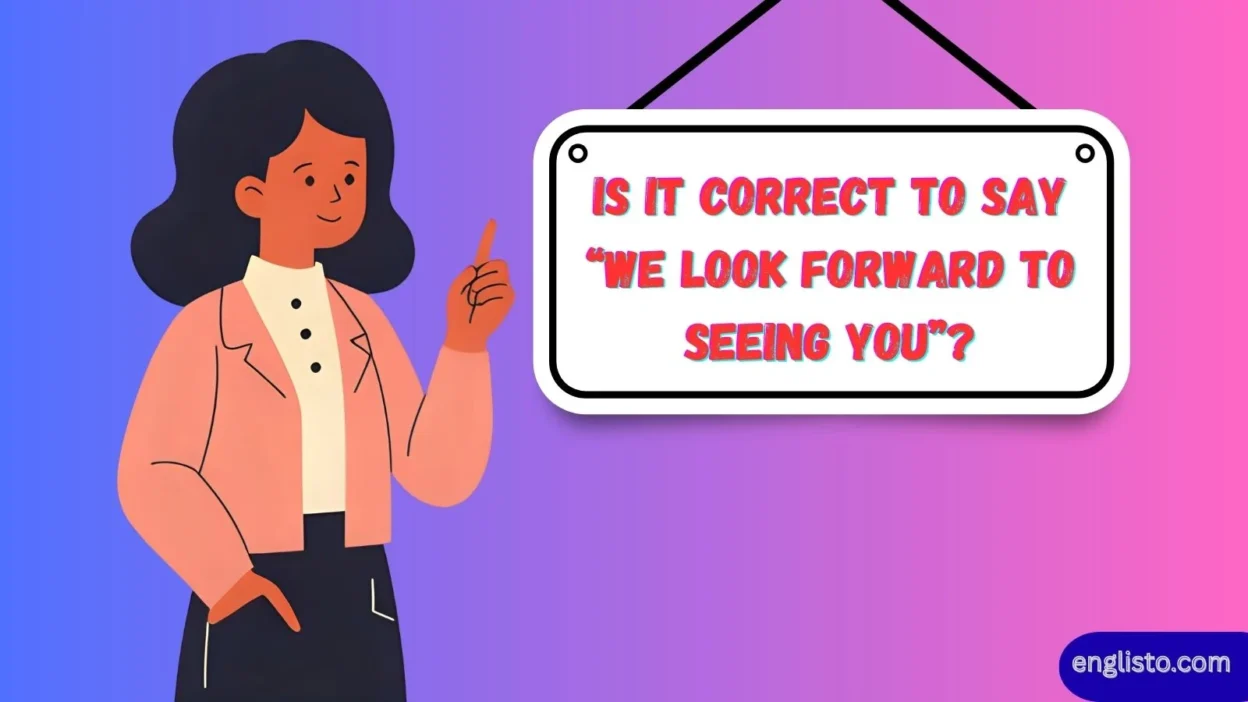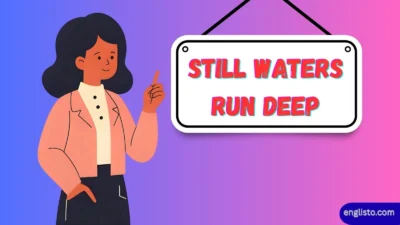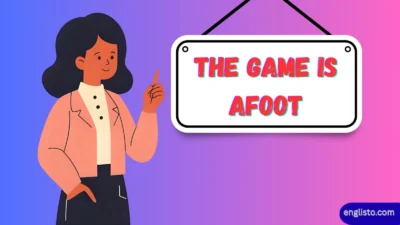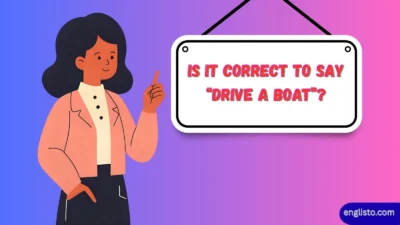Language is full of small but powerful expressions that shape how we connect with others. One such phrase you’ve probably read in professional emails, invitations, or friendly notes is: Is It Correct to Say “We Look Forward to Seeing You”?”.
But is this phrase grammatically correct, and why is it so widely used in both formal and informal communication? The short answer: Yes, it’s correct. Yet the deeper story lies in understanding why it works, what it conveys, and how it compares to alternatives.
This article breaks it all down—grammar rules, common mistakes, real-life usage, examples from business and everyday life, and alternatives you can use to keep your tone fresh, genuine, and appropriate for different contexts.
Why “We Look Forward to Seeing You” Is Grammatically Correct
At first glance, the phrase may look simple. But grammar nerds (and linguists like Antonio Rotolo, PhD, a Digital Humanist and Computational Linguist) remind us that every word is pulling its weight.
- Look forward to → Here, to isn’t an infinitive marker. It’s a preposition.
- After a preposition, English grammar requires a gerund (verb + -ing) or a noun.
- “Seeing” is the gerund form of the verb see.
So, when you say “look forward to seeing you,” you’re actually using the phrase in perfect compliance with English grammar rules.
Incorrect: We look forward to see you.
Correct: We look forward to seeing you.
Think of it like the phrase “I’m interested in learning.” You wouldn’t say interested in learn. The same principle applies.
The Meaning Behind the Phrase
Beyond grammar, the phrase carries emotional weight. It doesn’t just say, “We will see you.” It adds a sense of:
- Anticipation
- Excitement
- Politeness
- Warmth
It’s a way of showing you value the upcoming interaction—whether it’s a conference next week, a family gathering this Saturday, or a coffee catch-up tomorrow morning.
Common Contexts Where It’s Used
The phrase is versatile. You’ll spot it in:
| Context | Example Usage |
| Business emails | “We look forward to seeing you at the annual sales conference next week.” |
| Academic settings | “We look forward to seeing you at the symposium on digital humanities.” |
| Social gatherings | “We look forward to seeing you on Friday for dinner.” |
| Events & conferences | “We look forward to seeing you at Booth #23 during Expo 2025.” |
| Performances | “We look forward to seeing you at the theater this Saturday.” |
Notice how it works across both formal and casual occasions.
Common Mistakes to Avoid
Even though the phrase is correct, people often stumble when writing it. Here are some frequent pitfalls:
- Using the infinitive instead of the gerund
- ❌ We look forward to see you
- ✅ We look forward to seeing you
- ❌ We look forward to see you
- Leaving out the gerund entirely
- ❌ We look forward to you (sounds incomplete)
- ❌ We look forward to you (sounds incomplete)
- Making it sound robotic
- Overuse can make it feel generic. If you’re emailing the same group repeatedly, try alternatives.
- Overuse can make it feel generic. If you’re emailing the same group repeatedly, try alternatives.
- Mixing tenses awkwardly
- ❌ We are looking forward to see you yesterday (grammatical nonsense).
- ❌ We are looking forward to see you yesterday (grammatical nonsense).
Alternatives to “We Look Forward to Seeing You”
While this phrase is polite and professional, you might want to vary your tone depending on the situation. Here are some useful alternatives:
| Alternative | Tone/Usage |
| “We eagerly anticipate your visit.” | Formal, emphasizes eagerness |
| “We can’t wait to see you.” | Informal, enthusiastic |
| “We’re excited about seeing you.” | Friendly, casual |
| “We await your presence.” | Formal, slightly old-fashioned |
| “Looking forward to seeing you.” | Short, casual, often used in emails |
| “We’re keen to meet you.” | Neutral, British English flavor |
| “We hope to see you soon.” | Polite, slightly less committed |
Tip: Match your word choice to your audience. With clients, stay professional. With friends, feel free to show more excitement.
The Phrase in Professional Communication
In the world of emails, letters, and business interactions, the phrase shines as a polite closing remark. It helps maintain a balance between professionalism and warmth.
Example from a corporate email:
“Dear Mr. Wilson,
Thank you for confirming your attendance. We look forward to seeing you at the quarterly meeting on Thursday at 6 pm. Refreshments will be served before the session.
Best regards,
The Events Team”
Here, the phrase works as a friendly yet professional way to end the message.
Variations in Formality
The beauty of the phrase lies in its flexibility. Let’s compare:
| Version | Formality Level | Best For |
| “We look forward to seeing you.” | Neutral/Formal | Professional emails, event invites |
| “Looking forward to seeing you.” | Semi-formal/Casual | Friendly emails, internal team messages |
| “Can’t wait to see you!” | Informal | Friends, family, casual texts |
| “We await your arrival.” | Highly Formal | Ceremonial events, official speeches |
This shows why it’s broadly acceptable across contexts—from a boardroom to a barbecue.
Examples in Real-Life Usage
Here are sample sentences in different contexts to show how the phrase adapts:
- Business: “We look forward to seeing you at the Salesforce workshop next month.”
- Academic: “Our department looks forward to seeing you at the annual linguistics seminar.”
- Personal: “Mom and Dad look forward to seeing you when you’re back in town.”
- Performative: “The cast looks forward to seeing you in the audience tonight.”
Why It Conveys Politeness and Respect
The phrase isn’t just about grammar—it’s about tone. In English communication, politeness often comes from subtle signals. Saying “We look forward to seeing you”:
- Shows respect for the recipient’s time
- Expresses genuine excitement without being overbearing
- Maintains a positive, professional atmosphere
It’s a safe, reliable choice that avoids sounding cold or abrupt.
FAQs
Q1. Is “We look forward to seeing you” grammatically correct?
Yes. The preposition to requires a gerund, so “seeing” is correct.
Q2. Can I say “We look forward to see you”?
No. That’s incorrect because to is a preposition here, not part of the infinitive.
Q3. Is “Looking forward to seeing you” correct?
Yes. It’s a slightly more casual version, commonly used in emails.
Q4. What’s a more formal alternative?
You can say “We eagerly anticipate your presence” or “We await your arrival.”
Q5. Can the phrase be used in spoken English?
Absolutely. It’s natural in both spoken and written communication. Example: “Thanks for confirming. We look forward to seeing you next week.”
Conclusion
So, is it correct to say “We look forward to seeing you”?
The answer is a confident yes. It’s grammatically accurate, commonly used, and carries a sense of warmth and anticipation that makes interactions—whether professional or personal—more positive.
Use it freely in emails, letters, and conversations. Just remember: switch it up occasionally with synonyms to keep your communication fresh, genuine, and audience-appropriate.
At the end of the day, it’s not just a phrase—it’s a small but powerful way to show people they matter, and that their presence is valued.



